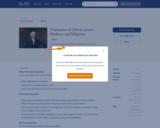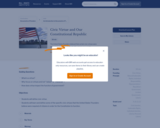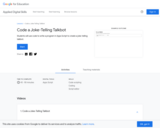
Try out Search Coach and Domains when researching celebrity fashion over time.
- Subject:
- Educational Technology
- Professional Learning
- Material Type:
- Lesson Plan
- Provider:
- Microsoft
- Provider Set:
- Microsoft Education
- Date Added:
- 02/27/2023

Try out Search Coach and Domains when researching celebrity fashion over time.

In this lesson, students will analyze James Madisonâ"s contributions through diligence to the establishment of the United States Constitution and early republic, exploring events that earned him the title, "Father of the Constitution."
This set of lessons extends over several weeks and incorporates all acts of Arthur Miller's play, The Crucible. Students will closely read The Crucible. Students will cite textual evidence and make interpretations about character development.Students will combine the textual evidence with their interpretations and write interpretive statements. In the culminating activity, students will write a character analysis.

In our school and social lives we exist in a mobile electronic world. Each day we "plug in" and charge our electronic devices and equipment. These electronics may range from small items (cell phones) to large items (electric vehicles). While in our own home, our family is most likely responsible for purchasing the charging equipment, and then paying an electric company/provider for the electricity we use.

The proliferation of electronic buses (e-buses) in cities across the globe represents a significant stride toward sustainable urban transport. With the mounting concerns over air pollution and climate change, many cities have been prompted to reconsider their reliance on traditional diesel buses. According to a recent report by Bloomberg New Energy Finance[1], e-buses are set to dominate the public transit sector, becoming the majority of all buses on the road globally by 2032. China has been particularly noteworthy in this transition, as it is home to most of the world’s e-buses, driven in large part by government policies that prioritize electric vehicles and stringent emission standards. Cities throughout the world (e.g., Bogota, Colombia, New York, USA, and Berlin, Germany) are also making concerted efforts to incorporate e-buses into their fleets, albeit at a more gradual pace.

This lesson centers around the How AI Works: Chatbots and Large Language Models video from the How AI Works video series. Watch this video first before exploring the lesson plan.
Large Language Models (LLMs) generate new text. The text LLMs generate looks like a human might have written it because large language models are built based on large bodies of text, such as Wikipedia. In this lesson, students learn what an LLM is and how it works, then use an LLM to co-create a text with AI. Finally, the class wraps up with a discussion about whether or not LLMs are intelligent or creative.
This lesson can be taught on its own, or as part of a 7-lesson sequence on How AI Works. Duration: 45 minutes

The principle of checks and balances prevents one branch of government from becoming too powerful. Examples of checks and balances include vetoing of bill, ratifying treating, judicial review and others. This lesson provides video clips with examples and explanations of checks and balances.

Try out Search Coach and Domains when researching choosing a pet.

In this lesson students will examine the concept of "citizen" from a definitional perspective of what a citizen is and from the perspective of how citizenship is conferred in the United States. Students will discuss the rights and responsibilities of citizens and non-citizens and review the changing history of citizenship from colonial times to the present.

What can we make of the massive amount of crime statistics collected in major cities? Beyond just reporting numbers, how can we use these data to determine the safeness of a city?

The purpose of this lesson is to engage students in a discussion of the Constitutional Convention.Students will explore the key disputes that arose during the convention, including most prominently how power would be divided between the federal and state governments and the various branches of government. Furthermore, students with understand the importance of compromise during the Constitutional Convention. They will then apply these observations to other historical examples of debate and compromise to understand the nature of decision-making and civic discourse--discussion rooted in mutual respect for differences and desires for understanding--in the United States.

The United States Founders believed that certain civic virtues were required of citizens in order for the Constitution to work. Numerous primary sources—notably the Federalist Papers and the Autobiography of Ben Franklin—point us to the "Foundersâ" Virtues." Before exploring the Documents of Freedom, it is important to understand civic virtue as an essential element of self-government.

This resource from the National Constitution Center includes an introduction, big questions, recorded class sessions, briefing documents, slide decks, and worksheets to help teach students the importance of civil dialog related to the United States Constitution.

In this lesson, developed by and included with the permission the LBJ Presidential Library, students will use primary source documents to investigate the disappearance of three civil rights workers during the Freedom Summer of 1964.

Try out Search Coach and Domains when researching Civil Rights: The Chicano Movement.

The purpose of this lesson to assist student understanding of why the American Constitution places ultimate authority of the military in the hands of civilians rather than military leaders. Students should appreciate the historical uniqueness of the American military as an extension of constitutional principles in which the people always have the last word.
This set of lessons extends over several days and focuses on "The Crisis, No. 1" by Thomas Paine. Students closely read and annotate the text. Students identify and evaluate claims and evidence in the text. Students present their findings to the class. Finally, students collaboratively write short arguments identifying claims and evidence in "The Crisis, No. 1." Students present their arguments to the class, and the class discusses and assesses the arguments.
This set of lessons extends over several days. Students watch a Prezi and take notes about the classical appeals (ethos, pathos, and logos). Students then read and annotate (focusing on the classical appeals) Winston Churchill's "Be Ye Men of Valour" and Franklin Delano Roosevelt's "Pearl Harbor Address to the Nation." Students work in groups to complete a graphic organizer which helps them analyze the classical appeals in the speeches. Finally, students write an analysis of ethos, pathos, and logos in one of the speeches.

Learn how to create a Joke-Telling Talkbot using coding in Google.

When European colonists came to North America, they faced the challenge of establishing societies that reflected their identity and mission for God. Experiments with economic and civil liberty followed in the name of the common good. Colonists and, later, the Founding generation became convinced that legally requiring individuals to commit their labor or their money towards a communal farm or church, with no regard for individual contribution or conscience, violated principles of justice.